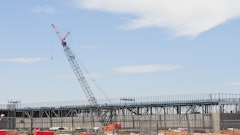When a general contractor is terminated by the owner of a construction project, is the subcontractor required to continue working for whoever takes over? The recent decision in Carolina Casualty Insurance Co. v. Ragan Mechanical Contractors Inc. lends hope to subcontractors that they can choose to either stay or go.
In Ragan, the general contractor (GC) entered into a contract with the Dekalb County Board of Education to build a high school. The GC obtained performance and payment bonds issued jointly by two sureties. The GC then entered into a subcontract with a subcontractor to perform the mechanical work on the project. Work proceeded until the Board issued a stop work directive. At that time the GC directed the subcontractor to cease all work on the job. The subcontractor stopped working but was not paid for the work it had performed — even though the GC was paid for the work.
Thereafter, the Board terminated the GC for default and demanded that the co-sureties discharge their obligations under the performance bond. The co-sureties subsequently entered into a takeover agreement with the Board to complete the prime contract, and hired a construction manager. The construction manager asked each of the terminated general contractor's subcontractors to sign a ratification agreement, under which they would agree to complete their work. The mechanical subcontractor declined to sign, however, instead seeking payment from the GC and the co-sureties under the payment bond for work already performed.
When the co-sureties refused to pay, the subcontractor brought suit. In defense, the co-sureties argued that the subcontractor had failed to perform its obligation to complete its work under the subcontract. A trial court held that, upon the GC's termination, the subcontractor had no further obligations under the subcontract. The co-sureties appealed.
The appellate court affirmed that the Board's termination of the GC also resulted in the termination of the subcontractor's contract. The court found that nothing in the subcontract expressly obligated the subcontractor to complete its work for the benefit of the co-sureties in the event of the GC's termination. The court also determined that even though the subcontract referenced the general contract, the subcontractor wasn't bound to the Board.
Rather, the subcontractor's primary undertaking was to perform its work for the benefit of the GC to enable the GC to meet its obligations under the general contract.
The subcontract expressly provided that the subcontractor assumed toward the GC all of the obligations and responsibilities that the GC assumed toward the Board, and that the subcontractor agreed to start work when notified by the GC and to complete work so as to enable the general contractor to fully comply with the prime contract.
Thus, while the GC was obligated to the Board to perform work under the general contract, the subcontractor was solely obligated under the subcontract to assist the GC in performing that work. The court concluded that when the Board terminated the GC's obligation, the subcontractor's obligation to assist in that performance also ended.
Finally, the appellate court also rejected the co-sureties' argument that the subcontractor's obligations to perform continued because the termination clause in the subcontract had not been triggered. The subcontractor's termination clause provided: "Should [the Board] terminate the [general contract] or any part of the [general contract] which includes the Subcontractor's Work, this [subcontract] shall also be terminated and Subcontractor shall immediately stop Subcontractor's related work."
The co-sureties argued this clause applied only where the Board terminated the general contract as a whole. The court, however, held that this argument ignored the plain language of the subcontractor's termination clause, which provided that the subcontract was terminated if "any part" of the general contract involving the subcontractor's work was terminated. So the Board's termination of even a part of the prime contract was enough to trigger the subcontract's termination.
Ragan indicates without an express subcontract provision requiring assent to an assignment of their subcontracts to the GC's surety, subcontractors may not be bound to complete their work for a takeover surety. Be aware of how such an "assignment" provision affects your obligations before agreeing to include it in your subcontract.
Gerald I. Katz is an attorney specializing in construction law with Katz & Stone LLC, Suite 600, 8230 Leesburg Pike, Vienna, VA 22182.


























